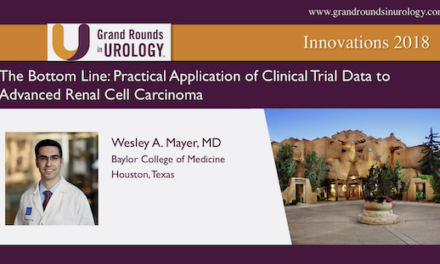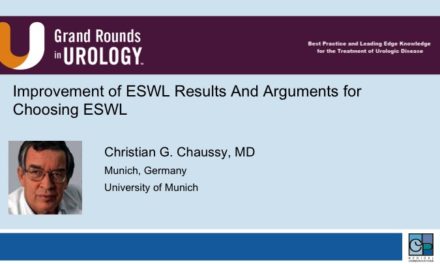
A Phase 2 Trial of Lenvatinib 18 mg vs 14 mg Once Daily (QD) in Combination With Everolimus (5 mg QD) in Renal Cell Carcinoma
Abstract
Based on findings from a phase 2 study, lenvatinib (LEN) plus everolimus (EVE) was approved in the United States and European Union for patients with advanced renal cell carcinoma (RCC) following 1 prior anti-angiogenic therapy. In that study, LEN 18 mg QD plus EVE 5 mg QD significantly prolonged progression-free survival (PFS) compared with either monotherapy. In the LEN+EVE cohort, grades 3 and 4 treatment-emergent adverse events (TEAEs) occurred in 71% of patients. We report the design of a multicenter, randomized, double-blind, phase 2 study to evaluate if a lower LEN starting dosage regimen provides similar efficacy with a better safety profile than LEN 18 mg plus EVE 5 mg (NCT03173560).
Eligible patients are aged ≥ 18 years with histologic or cytologic confirmation of predominantly clear cell RCC, advanced RCC, 1 prior anti-vascular endothelial growth factor therapy for advanced RCC, ≥ 1 measurable target lesion according to RECIST 1.1, and a Karnofsky Performance Status score of ≥ 70. Patients will receive LEN 18 mg or 14 mg QD plus EVE 5 mg QD in 28-day cycles until disease progression, unacceptable toxicity, or withdrawal of consent. The LEN 14-mg dose will be escalated to 18 mg if no intolerable grade 2, or any grade ≥ 3, TEAEs requiring dose reduction occur in cycle 1. The primary endpoints are objective response rate (ORR) at week 24 (ORR24W) and the proportion of patients with intolerable grade 2, and any grade ≥ 3, TEAEs within 24 weeks after randomization. Secondary endpoints include PFS and ORR. An estimated 306 patients will be randomized. Sample size is based on detecting noninferiority of ORR24W and superiority of the primary safety endpoint. Two interim analyses will be performed when 150 and 200 patients have completed 24 weeks of follow-up or discontinue earlier. Each analysis will test noninferiority and futility of the LEN 14-mg arm ORR24W versus the 18-mg arm ORR24W. An O’Brien-Fleming boundary will be used for noninferiority. If the 1-sided P-value is ≤ 0.005 at the first interim analysis, ≤ 0.014 at the second interim analysis, or ≤ 0.045 at the final analysis, then noninferiority in ORR24W will be claimed. If the futility boundary is crossed (ie, 1-sided P-value is ≥ 0.776 at the first interim analysis or ≥ 0.207 at the second interim analysis), then futility will be claimed.
Authors: Pal, Sumanta K | Puente, Javier Heng | Daniel Rha, Sun Young | Li, Di | Stepan, Daniel E | Dutcus, Corina E | Glen, Hilary
Journal: Kidney Cancer, vol. 2, no. s1, pp. I-S50, 2018



